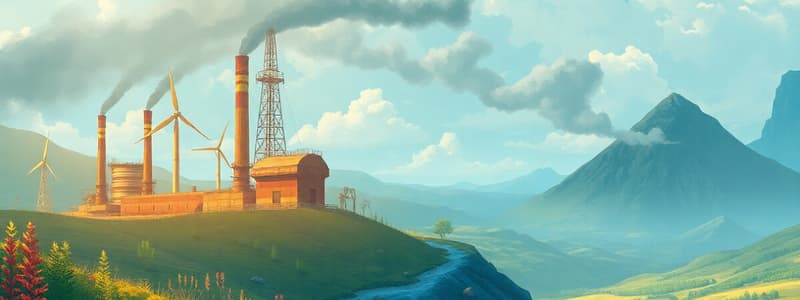Podcast
Questions and Answers
What are fossil fuels primarily formed from?
What are fossil fuels primarily formed from?
- Remains of living organisms (correct)
- Minerals found underground
- Ancient sediments
- Modern agricultural waste
Which of the following is NOT a type of fossil fuel?
Which of the following is NOT a type of fossil fuel?
- Coal
- Natural gas
- Oil
- Ethanol (correct)
What process leads to the transformation of organic matter into fossil fuels?
What process leads to the transformation of organic matter into fossil fuels?
- Fermentation
- Burial and heat application (correct)
- Photosynthesis
- Combustion
What is a major environmental concern associated with fossil fuels?
What is a major environmental concern associated with fossil fuels?
How are oil and natural gas typically extracted from underground deposits?
How are oil and natural gas typically extracted from underground deposits?
What is the primary environmental impact of burning fossil fuels?
What is the primary environmental impact of burning fossil fuels?
What is the main component of hydrocarbons found in fossil fuels?
What is the main component of hydrocarbons found in fossil fuels?
Which fossil fuel is typically solid at room temperature?
Which fossil fuel is typically solid at room temperature?
Which characteristic makes fossil fuels advantageous for electricity production?
Which characteristic makes fossil fuels advantageous for electricity production?
What is one of the main advantages of using fossil fuels?
What is one of the main advantages of using fossil fuels?
What is one reason coal remains a widely-used fossil fuel despite its disadvantages?
What is one reason coal remains a widely-used fossil fuel despite its disadvantages?
What mining technique is commonly used today for coal extraction?
What mining technique is commonly used today for coal extraction?
Natural gas primarily consists of which compound?
Natural gas primarily consists of which compound?
What is a significant disadvantage associated with transportation of fossil fuels?
What is a significant disadvantage associated with transportation of fossil fuels?
Which of the following issues is a result of burning coal?
Which of the following issues is a result of burning coal?
Flashcards
What is Coal?
What is Coal?
A black, sedimentary rock formed from ancient plant matter, primarily found at ancient river mouths.
What are fossil fuels?
What are fossil fuels?
Ancient fuels formed from the remains of living organisms, typically mined from underground and hundreds of millions of years old.
Open Pit Mining
Open Pit Mining
A type of mining where large holes are dug to extract coal, leaving the land open or refilled with dirt.
How are fossil fuels formed?
How are fossil fuels formed?
Signup and view all the flashcards
What is Natural Gas?
What is Natural Gas?
Signup and view all the flashcards
What are hydrocarbons?
What are hydrocarbons?
Signup and view all the flashcards
Fracking
Fracking
Signup and view all the flashcards
What is oil (petroleum)?
What is oil (petroleum)?
Signup and view all the flashcards
What is natural gas?
What is natural gas?
Signup and view all the flashcards
Dispatchable Energy
Dispatchable Energy
Signup and view all the flashcards
What is coal?
What is coal?
Signup and view all the flashcards
High Energy Density of Fossil Fuels
High Energy Density of Fossil Fuels
Signup and view all the flashcards
Fossil Fuel Emissions and Climate Change
Fossil Fuel Emissions and Climate Change
Signup and view all the flashcards
What is a negative impact of fossil fuels?
What is a negative impact of fossil fuels?
Signup and view all the flashcards
Why are fossil fuels unsustainable?
Why are fossil fuels unsustainable?
Signup and view all the flashcards
Study Notes
Fossil Fuels Definition
- Fossil fuels are ancient energy sources formed from the remains of organisms (plants, algae).
- Primarily mined from underground, they're millions of years old.
- Examples include coal, oil, and natural gas.
- Formation: Organic matter (like plants) is buried in oxygen-lacking environments. Pressure and heat transform this matter over millions of years into hydrocarbons (long chains of carbon and hydrogen).
- Combustion: Burning releases stored energy, transforming hydrocarbons into carbon dioxide and water.
- Industrial Usage: Crucial for industries, transportation, and electricity generation. Fossil fuels are cheap and highly concentrated energy sources.
- Sustainability Concerns: Notable differences from renewable sources are pollution and limited supply.
Types of Fossil Fuels
- Oil (Petroleum): Liquid; extracted from underground deposits, often using pumps or drilling rigs, depending on the location (land or ocean).
- Processed to separate it into various fuels according to their density (e.g., gasoline, diesel, heating oil).
- Natural Gas: Gaseous; found in various rock formations (shale, sandstone, coal seams).
- Often extracted using large, steerable drills, sometimes employing fracking techniques (using explosives to fracture rock and release gas).
- Primarily methane (one carbon, four hydrogen atoms). Used for electricity generation, heating.
- Coal: Solid; typically formed from ancient river mouth plant matter.
- Historically mined via shafts and scraping; modern methods include open-pit and strip mining. Used in power plants, industrial processes (e.g., metal production).
Fossil Fuels: Advantages and Disadvantages
Advantages
- High Energy Density: Release substantial energy when burned.
- Low Cost: Historically, they've been relatively inexpensive.
- Abundant Reserves: Large deposits exist in various regions.
- Dispatchable: Generation can be adjusted according to demand.
Disadvantages
- Pollution: Combustion leads to air pollution (carbon dioxide, oxides of sulfur and nitrogen, volatile organic compounds).
- Climate Change: A key contributor to greenhouse gas emissions, particularly carbon dioxide. Also, natural gas (methane) is a powerful greenhouse gas.
- Water Pollution: Runoff from mines, pipeline leaks, and fracking fluids contaminate water.
- Acid Rain: Coal burning releases sulfur dioxide, forming sulfuric acid in the atmosphere.
- Transportation Hazards: Oil spills, pipeline leaks, methane leaks, pose significant threats.
- Non-Renewable: Finite reserves; take millions of years to form.
Studying That Suits You
Use AI to generate personalized quizzes and flashcards to suit your learning preferences.




